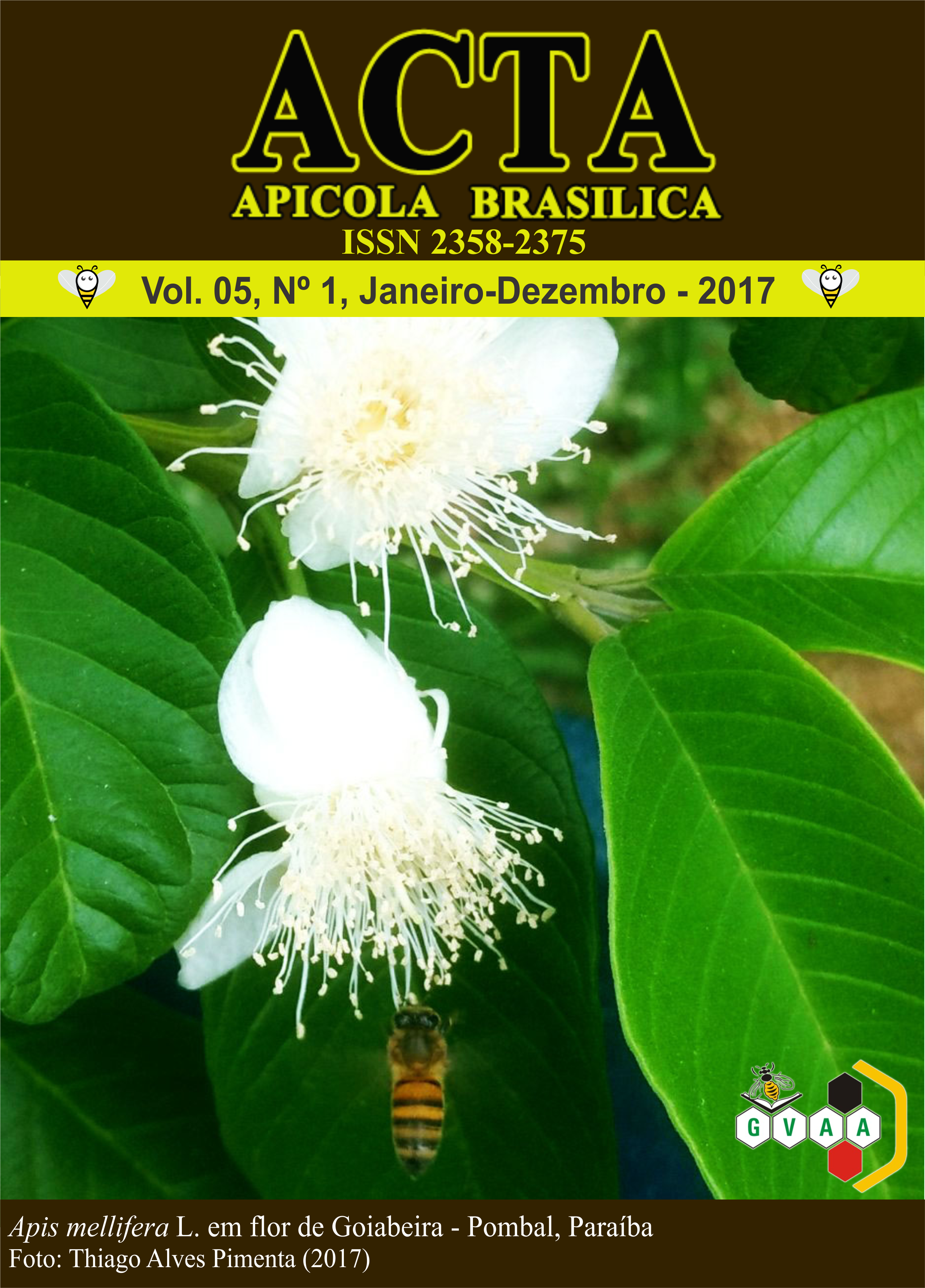Risks in the work environment and types of accidents with beekeepers in the city of Aparecida, Paraíba, Brazil
DOI:
https://doi.org/10.18378/aab.v5i1.5671Keywords:
Beekeeping, Workplace safety, Risks in facilities, Frequent accidentsAbstract
The objective of this study was to characterize the risks in the apiaries' facilities, identifying the most frequent accidents with Apis mellifera breeders in the city of Aparecida, Paraíba. The research period was from August to September 2017, with interviews and application of a semi-structured questionnaire with the producers, observing the following parameters: distance from the apiary to inhabited places, arrangement of the soil where the hives are located, time of accomplishment the existence of warning signs, where the processes of deopulation and centrifugation are carried out, knowledge about the degree of sensitivity to the poison, level of training for beekeeping practices, accidents occurring since the beginning of the activity and where care was given . The statistical analysis was descriptive, expressed in quantity and percentage through tables and graphs. It can be observed that beekeepers have a good knowledge about work safety with bees, with facilities of apiaries following technical guidelines. It was also found that beekeepers are well trained for breeding practices and that the most frequent accidents were stinging and intoxication.Downloads
References
ALMEIDA, G. F. Fatores que interferem no comportamento enxameatório de abelhas africanizadas. 2008. 120 f. Tese (Doutorado em Entomologia) – Faculdade de Filosofia, Ciências e Letras de Ribeirão Preto, Universidade de São Paulo. Ribeirão Preto, SP. 2008.Disponível:. Acesso em 28 de janeiro de 2018.
ASSOCIAÇÃO BRASILEIRA DE ESTUDOS DAS ABELHAS (A.B.E.L.H.A.). Associação civil, sem fins lucrativos e conotação político-partidária ou ideológica, com o objetivo de liderar a criação de uma rede em prol da conservação de abelhas e outros polinizadores. 2015. Disponível:.Acesso em 28 de janeiro de 2018.
BRASIL. MINISTÉRIO DAS MINAS E ENERGIA. Projeto cadastro de fontes de abastecimento por água subterrânea. Diagnóstico do município de Aparecida. Recife: CPRM, 2005. Disponível em: http://rigeo.cprm.gov.br/xmlui/bitstream/handle/doc/15832/R_Aparecida.pdf?sequence=1 Acessado em: 04 de setembro de 2017
BREYER, E. U. 1980. Abelhas e Saúde. Uniporto Gráfica e Editora Ltda. Porto União. 70p.
ESPÍNDOLA, E. A.; CASSINI, F. L.; KALVELAGE, H.; DELATORRE, S. F.; FUCHS, S.; VIDI, V.; MIGUEL, W. (Org). Curso profissionalizante de apicultura. Florianópolis: EPAGRI, 2002. 136 p. (EPAGRI. Boletim Didático, 45).
NASCIMENTO JÚNIOR, A. V. Abelhas: como criar? 3. ed. Contagem: Cia. da Abelha, 2002. 220p
PAULA NETO, F. L.; ALMEIDA NETO, R. M. Apicultura nordestina: principais mercados, riscos e oportunidades. Fortaleza: Banco do Nordeste do Brasil, 2006. 78 p. Disponível . Acesso em 28 de janeiro de 2018.
PEDROSO, L. G.; FEITOSA, C. O. Contrastes da produção de mel de abelhas na região Sul e Nordeste do Brasil: possibilidade de expansão da atividade no Nordeste. In: SOCIEDADE BRASILEIRA DE ECONOMIA, ADMINISTRAÇÃO E SOCIOLOGIA RURAL - SOBER NORDESTE, 8., 2013, Parnaíba. Anais...Parnaíba: UFPI, nov. 2013. 20 p.
REIS, V. D. A; PINHEIRO, R. S. Procedimentos de Segurança no desenvolvimento da apicultura com abelhas africanizadas (Apis mellifera L.) Circular Técnica 64. Embrapa. ISSN 1517-1965. Corumbá, MS. 2006.
SANDES JÚNIOR, R. L. Estudo de ocorrências de enxames migratórios do gênero Apis na cidade do Salvador no período de 2000 a 2004. 2007. 80 f. Dissertação (Mestrado em Ciência Animal nos Trópicos) – Escola de Medicina Veterinária, Universidade Federal da Bahia. Salvador, BA. 2007.
SANTOS, A. M. M; MENDES, E. C. Abelha Africanizada (Apis melífera L.) em áreas urbanas no Brasil: Necessidade de monitoramento de risco de acidentes. Revista Sustinere, Rio de Janeiro, v. 4, n. 1, p. 117 -143. 2016.
SEBRAE. Serviço de Apoio às Micro e Pequenas Empresas. (PE). Boletim setorial do agronegócio: Apicultura. Recife, PE. Maio de 2011. 24 p. Disponível em <http://www.sebrae.com.br/Sebrae/Porta>. Acesso em 19 de janeiro de 2016.
ZANUSSO, J. Localizando a China. Apicultura. Universidade Federal de Pelotas, RS. 2011.













